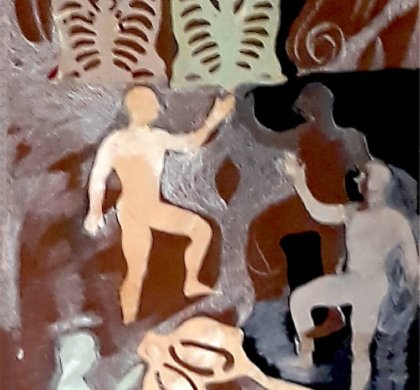
Note 55
It is our 55th release of Out of Print. We feature seven stories. Diverse, they examine death and the afterlife, the spectre of AI and how it plays into the way we think feel and structure our lives, our worlds, our perceptions of ourselves and our social structures. At the same time love, family, marriage, power, and a sense of humanity are explored through the works. Out of Print rarely comments on story structure or language quality or other parameters that one may use to measure the value of a story – its appearance in the magazine is measure enough – but in this case, it seems necessary to emphasise that in all their variety, the narrative line and pacing of these works drive them.
Mashiul Alam’s ‘The Hands of the Man of Light’ translated from Bangla by Shabnam Nadiya begins with a little boy’s frustration and the sense of betrayal he feels because of a gambling father and the repercussions thereof on the family. A complex, layered social commentary on family, village, politics, and greed, it takes the reader into realms – dreamt or imagined or experienced – beyond the real.
The idea of conversations from across dimensions is taken to a specific and personal place in Shinie Anthony’s ‘Why We Don’t Talk’. A young girl is communicating to a young man her observations and readings about him. This is someone with whom she bears a singular and intriguing relationship. One that binds them inextricably across time.
In Kiran Bhat’s ‘Mohan Ray’ we discover that Jagmohan Singh, the hardworking family man, a migrant refugee of Partition, has transformed after a long period of isolation and heartbreak into the immortal pop icon Mohan Ray. But who is Mohan Ray and how did this extraordinary transformation take place – these questions and more are dealt with, revealing the great human spirit, buffeted by love and yearning for his family that survives within him through the change.
Vrinda Baliga’s ‘Breakout’ is the winner of the inaugural Bangalore Writer’s R K Anand Prize for short fiction. Her story responds to the immense pressure that our educational system imposes on students and imagines a world, directed by the new creature in our midst – AI. Imbued with an underlying disquiet, an anxiety, the plot reveals an underground resistance to mute acceptance and hints at the power of quiet sustained rebellion.
We walk with the main character in Shebana Coelho’s ‘In Step’ as she strides through the forest with her new husband, exploring his world, his ‘other life’, his true self that he wishes to reveal to her. What will she do when they hit a slope and ‘his legs move up and out of sight into the forest above’, will she follow him? Find a way to stay in step?
In ‘The Tenants’ by Kinjal Sethia, set in an old Bombay chawl bearing ‘the shape of a horseshoe on what became one of the busiest chowks off LBS road’, two older residents, who’d had noticed each other in their younger years, get reacquainted. As they find ways of wandering through Chowpatty, and getting to know each other, will they stay in step?
A young woman girds herself up for the inevitable harassment she must face from the local rowdies as she approaches her home. What will give her the strength to confront and deal with her oppressors? How will she move from the meekness of her mother’s way of dealing with these men, to taking a stand? Who will stand with her? That is Sudha Subramanian’s explicitly titled story, ‘How to Ward off Evil with Two Words’.
The art on the cover of Out of Print 55 is by Bharati Kapadia.
